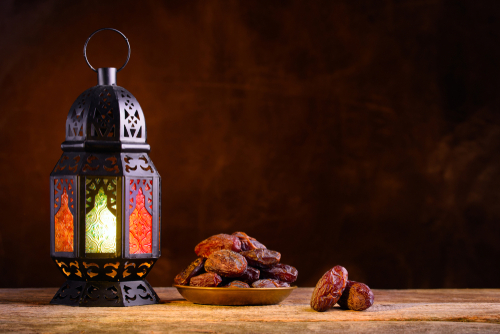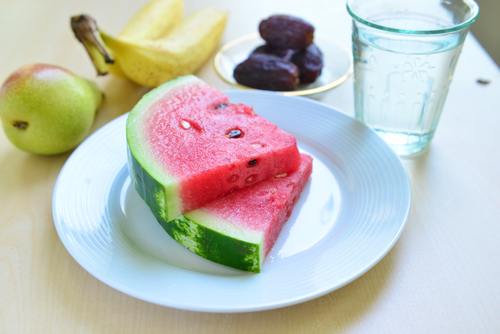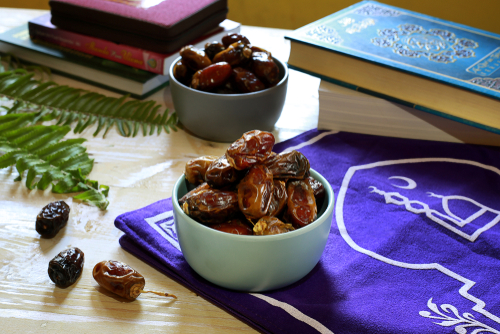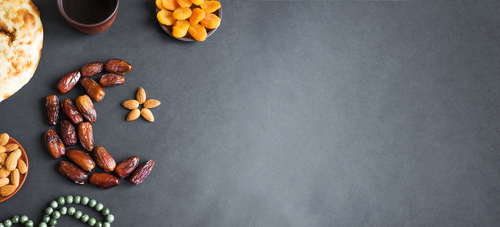Ramadan can be an excellent chance for Muslims to stay healthy and productive, depending on following certain nutrition habits that can change their lives during this holy month.

Many people think it’s normal to be constantly tired and unproductive in Ramadan, while it’s not true. The nutrition habits in Ramadan play a massive role in giving Muslims a better and healthier lifestyle.
Sometimes we follow unhealthy habits that cause exhaustion and dehydration, especially with our traditional foods and drinks. Most of them are full of sugar and fats; at the same time, many people tend to eat vast amounts of food on Iftar.
Let’s talk more about our habits in Ramadan and how to be more productive by following healthier nutrition habits.
“How can I stay healthy and productive in Ramadan?”
1- Stay hydrated
To avoid dehydration, you should drink at least eight glasses of water between Iftar and Suhoor. You can also drink more fluids like juice, milk, and soup.Keeping your hydration levels is good for your body organs, helps blood pressure levels, and avoids fasting exhaustion. Don’t forget to eat foods with water content like fruits and vegetables.
Moreover, avoid drinking caffeine, as it might cause dehydration.
2- Pick the right food for suhoor
Suhoor is an essential meal in Ramadan, as it helps you go through the whole day of fasting. Don’t ever skip it, because that will cause you tiredness and low blood pressure for the entire day.Fruits and vegetables are essential on suhoor as they contain many fluids and help you stay hydrated for the whole day.
Dairy products like yogurt and milk are also very beneficial when you have a long day of work and duties.
Additionally, fiber-rich food keeps your stomach full during fasting, as it’s digested slower.
Don’t forget to have healthy fats like olives.

3- Don’t overeat on Iftar
Overeating on Iftar harms your health, your body, and your digestion a lot. It also makes you weigh a lot of gains and causes morning tiredness.Eat your Iftar slowly and enjoy every bite of it, as it takes your body twenty minutes to register if the food you’ve eaten is enough or not.
If you eat a lot of food suddenly, your body won’t have space to digest, and you won’t be enjoying the taste of your meal.
4- Avoid sugary food
Eating foods that are full of sugar and fats makes you feel thirsty for the whole day. It also causes fatigue and weight gain.Why make your fasting difficult while it can be easier for you by following healthy nutrition habits?
Avoid fried food on Iftar. We know how much it’s hard to resist these kinds of food, but you can find healthy and tasty alternatives.
Roasted and baked food is also very delicious. You can find a lot of videos about great recipes for healthy food.
Additionally, avoid having pickles or much salt on suhoor, as they cause dehydration.
5- Don’t forget to exercise
Exercising helps you stay healthy and in shape during Ramadan. It also gives you a chance for a better fasting experience.It’s essential to know what kind of exercises your body can take during Ramadan. Avoid high-intensity practices and go for simple ones. Walking, cycling, and slow jogging can be great ideas.
Specific times are better for exercising, like after Taraweeh prayers and before suhoor.
6- Have a balanced meal on Iftar
Most Muslims start their Iftar with three dates. They are rich in fibers, so they provide good nutrition for the body after a long day of fasting.After eating dates, you can start with a salad, as they provide you with needed hydration and help you eat less.
Go for proteins after that, like meat, fish, or eggs. Don’t forget about eating whole grains and rice, and they will provide you with a lot of energy and nutrition.

7- Eat traditional food, just mind quantity
The traditional food of Ramadan is a part of Muslims’ cultures. We understand that you cannot give up on eating it.The quantity is all that matters when it comes to traditional foods. You don’t have to stop eating all the traditional food, but pay attention to the amounts you consume.
There are also healthy recipes and alternatives for the fatty ones of them. You can use coconut oil for cooking, for example.
In conclusion,
Fasting doesn’t mean gaining excessive weight and starting unhealthy habits. You can take the chance of fasting to change a lot about your lifestyle and nutrition habits.








 2023-04-26
2023-04-26
 2023-04-04
2023-04-04
 2023-03-22
2023-03-22
 2023-03-20
2023-03-20
 2023-03-08
2023-03-08